I don't think people know what it really takes to make a lawn look pretty," says Beau Davis about the challenges of being a professional landscaper and operating a grounds maintenance business. He's not talking about a homeowner who lavishes untold time and money to make their lawn the pride of the neighborhood. He's talking about making the lawns and landscapes of 800 individual residential and commercial customers "look pretty."
That's only part of his challenge, Davis says. Equally important is that he needs to make some money doing it. This means he needs to keep his equipment running at full speed. An idle mower is lost revenue.
Davis owns and operates Advanced Lawn Care & Fertilizing Inc. in Springfield, Mo., which employs between 8-10 people full time year round and up to 20 during the busy seasons. With any luck, Davis says he could hit $3-3.5 million in annual revenues in the near future.
That puts Advanced Lawn Care in an industry that encompasses more than 90,000 individual business units throughout all 50 states that compete in the lawn care and grounds maintenance industry. There are more than 1,800 firms that fit the description of lawn care and ground maintenance businesses. To say it's a highly competitive business would be an understatement. In total, these establishments include more than a 500,000 individuals on their payrolls. On average, each of these businesses employs about 18 people.
With its heavy reliance on a healthy housing market, the sluggish economy of the past few years has taken its toll on the lawn care industry. But, according to the U.S. Dept. of Labor's Bureau of Labor Statistics, employment in the various segments of these businesses is expected grow anywhere from 12-26% by 2018. That's a good sign for companies like Advanced Lawn Care and the dealers who supply them with equipment. It represents real revenue growth and real sales potential.
But Davis says for dealers to take advantage of this forecasted growth, they need to feel the same urgency he does in trying to keep his customers happy. This includes servicing equipment in hours, not days, and keeping repair parts in inventory.
A Busy Man
In addition to his grounds maintenance business, which he divides into mowing, irrigation and turf maintenance (fertilization), Davis also raises cattle. He grew up on a farm outside of Springfield and says, "My dad was the biggest black farmer in the state of Missouri. I grew up operating farm equipment."
While his brother operates the family farm today, Davis has established his own operation with 500 head of cattle including 300 "mama cows" on nearly 800 acres.
|
On top of this, for 28.5 years before he started his grounds maintenance business, Davis was a meat cutter and managed the meat department for a chain of grocery stores.
"I know the retail end of business," he says. It's his farm background as well as working in retail that has instilled him with a sense of urgency he expects from his suppliers.
He says crops and livestock don't wait for the farmer, which means you have to get after it. The same was true of his retail experience. "In the meat business, we had a saying, 'Either you sell it or you smell it.' We had to make sure we sold our fresh meat in 4 or 5 days," he says.
Today, Davis' quality of life depends on the success of his lawn care business. As such, he's totally dependent on his equipment, which means he relies on his equipment dealer to keep him up and running.
"If the machines are running and we've got adequate help for scheduled production, we can make money," Davis says. "I know how many dollars each lawn mower can bring in during a workday. I know how much we're spending on gas in a day, and I know how much my labor costs each day."
He also knows how much money he's losing when his equipment isn't running.
Demanding Customers
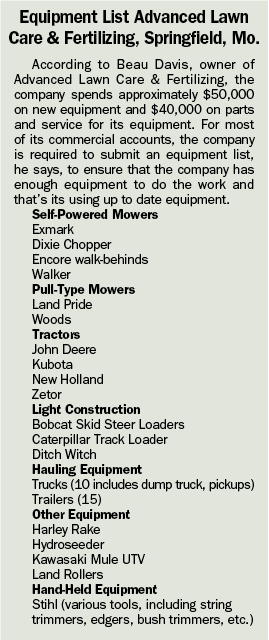
|
Advanced Lawn Care's 800-plus client base is split approximately 60% residential and 40% commercial. On the revenue side, Davis says it's just the opposite with commercial customers accounting for about 60% of annual income dollars. The company mows and maintains more than 200 properties a week.
He counts AT&T, John Q. Hammons hotel and resorts, Kraft Foods and T-Mobile among his biggest customers. "We take care of 83 or 84 properties for AT&T, 12-15 for Hammons and all of Kraft Foods' property in the area," says Davis. 'That includes everything from snow removal to mowing their grass. Our motto is, 'Everything from grow to snow.'"
Overall, he finds his commercial accounts easier to please. "They'll shop you around, but if you do a good job and are priced competitively, most commercial customers don't really want to make a change. They want their grass striped nice. They want their bushes trimmed. But most don't want to go through the hassle of bidding the job out and then training a new supplier," Davis says.
On the other hand, he points out, if one of his guys scalps Mrs. Olson's lawn, he's sure to hear about it. Residential mowing, he says, is the hardest job the company does. "If you scalp Mrs. Olson's yard where she can see it, you can bet she'll be on the phone to the office."
But if he isn't able to get her lawn mowed on schedule, it's even worse. That's why he pushes so hard for a fast service turnaround from his equipment dealer. He says his demands from equipment suppliers only reflect those of his customers.
He explains that as efficiently as he runs his business, it still takes volume to make money in the lawn care industry, which only adds to the daily pressure. "You can't make it on margins," say Davis
High Expectations
So what's reasonable service time to get a piece of equipment up and running for a grounds maintenance company like Advanced Lawn Care? Two or three days?
"No. I'd like to see 2 or 3 hours," Davis says. "If it's not an engine problem or a hydraulic pump, it seems they should be able to have the machine going in 3 or 4 hours."
He doesn't think service is a strong point of most dealerships in the Springfield area. He says, "A dealership that's just a 'little better' could own this market."
He believes his dealer, S&H Farm Supply in Rogersville, Mo., is on the right track when it comes to service, but still, "they need to perfect it," he says.
One of the biggest problems with dealers that Davis sees is a lack of parts inventory.
"The economy is so tight, people don't want to warehouse parts. They want to overnight everything and that can be devastating in the commercial grass cutting business. On top of it, it's going to cost another $15 to get it tomorrow."
He adds that it's not uncommon for dealers to have to order parts more than once because of clerical errors. "It happens far more than you might think," Davis says.
He recalls when he first got into the business he couldn't afford to buy back-up equipment. With his success, that isn't so much the case today, but it continues to irk him that equipment service takes as long as it does. He attributes this to a lack of urgency on the part of dealers.
At one point, he even considered opening his own shop for repairing equipment. He says he had to remind himself that he's in the mowing business, not the mechanic business.
A Personal Mechanic?
So, what could an equipment dealer do to improve their service levels for businesses like Advanced Lawn Care?
At the least, he says, he'd like his dealers to communicate with him so he's not wasting his time and fuel running back and forth to the dealer. For example, if the dealer orders a part and it isn't delivered on time, he would like them to let him know. "If you ain't got it, you ain't got it. It's not in the mail. It's still on order. Be 100% honest and save us both time and aggravation," he says.
|
"Any time fuel gets over $2.30 a gallon, it'll eat your lunch in this business because most bids are based on $2 a gallon. That includes getting to and from a job as well as running back and forth between the dealership."
He also asks that the dealer keep him informed on the status of a repair. "I don't think that's asking too much," Davis adds.
But what he'd really like to see is a service tech assigned to his account. Not exactly a "personal mechanic," but someone dedicated to Advanced Lawn Care's service. "This," he says, "I would pay extra."
Instead of calling the parts manager who then speaks with the service manager who then hands it off to a service tech, Davis would like to be able to communicate directly with "Fred, my mechanic," he quips.
"Then I could develop a relationship with Fred," says Davis. "But this time I have Fred. The next time I have Bill and then Joe. But I still have to speak with the manager to find out what's going on. I'd really pay a little more to be able to deal with the same mechanic every time I needed something done. It's all about communication."
While he can appreciate the approach of dealers treating all of their customers the same, he says that's not the real world. "It's a nice concept, but if I've got 15 mowers and another guy has 3, I would think I could get a little more attention," Davis says.
Beau Knows Equipment
|
There's little doubt that Beau Davis knows equipment and likes talking about it, whether it's for his landscaping business or for his farm.
Now in its 15th year in business, Davis has expanded beyond mowing and general land maintenance, like many others in the business. Along the way he's added landscaping and irrigation to the services he offers. Turf maintenance, where the company handles all aspects of fertilizing, weed and insect control, is becoming a larger part of the company's offerings, as well. "We try to be a one-stop shop for a wide range of customers," he says.
Within the landscaping division, in addition to hydroseeding, planting trees and ornamental bushes, Davis' crew builds retaining walls and patios.
One of the largest landscaping jobs that Advanced Lawn Care has landed included hydroseeding and landscaping 17 acres that included planting dozens of trees, and building an 8,000 square-foot paver patio for the Missouri Army National Guard facility in Springfield. Davis calls that contract "a blessing."
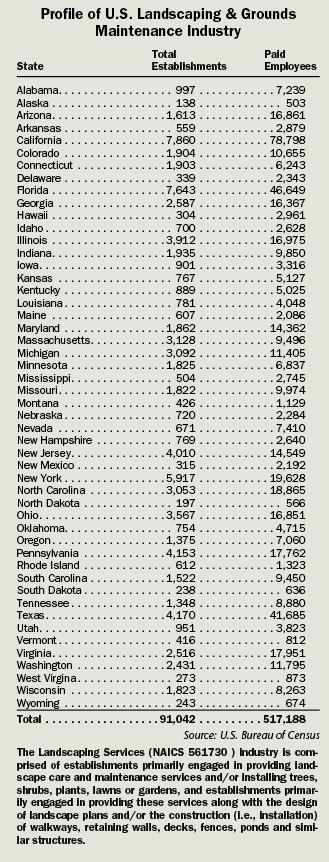
|
With his expansion into other segments of lawn care and landscaping, Davis has added a wider range of equipment. (See Advanced Lawn Care's equipment list on p. 32.)
Annually, he estimates that he invests $50,000 in new equipment and another $40,000 in parts and service.
A zero-turn mower will typically see about 1,200 hours of work in a year, and last 3-4 seasons, "If they're taken care of," Davis adds. If it makes sense to switch out a motor, they could last 5-6 seasons. The 25-32 horsepower models are best for his type of work.
There's little doubt about Davis' favorite brand of mowers. "The very first mower I bought when I started this business was a Dixie Chopper with a 22-horsepower Kohler Commander engine. Every good and bad employee I had drove it for 6.5 years. It finally blew its engine with more than 8,000 hours on it," he says proudly.
He still likes Dixie Choppers but he's diversified into other brands for a variety of reasons. For instance, he says Exmark zero-turn mowers have the best deck going. "If you want to make a lawn look real pretty, Exmark mowers will do it with less effort. We only use Exmarks on our high-profile lawns."
That, he says, is because the mower deck is designed to create a higher level of vacuum. The more vacuum suction a mower deck producers, the straighter and higher it pulls the grass making a nice even cut, according to Davis.
In the way of tractors, he has a John Deere utility tractor, a Kubota 46-horsepower model and an older Zetor unit he uses around his farm.
More recently, he purchased a New Holland compact from S&H Farm Supply.
Five years ago, Davis had need for another tractor and his search took him to S&H Farm Supply. He ended up purchasing a New Holland tractor, "Because I liked the hydrostatic transmission and the way it shifts," he says.
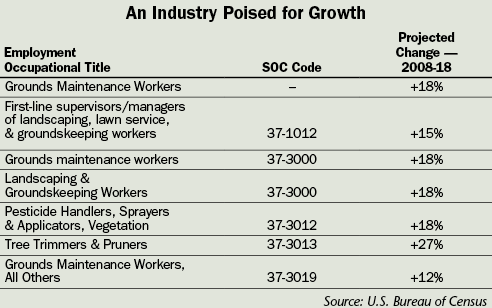
|
He admits that the dealership also played a role in that decision because they're the only ones in area, he says, that carried Harley rakes. "I guess it was also the convenience of the dealership, and their salesman was really good and he cared."
That dealer "caring" has turned into several subsequent purchases by Davis, including a new Harley rake, a New Holland S170 skid steer loader and several Exmark mowers.
It pays to care.

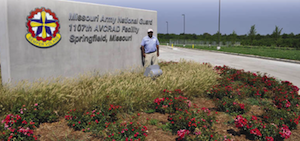
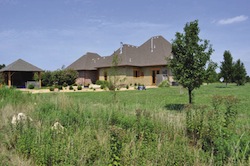
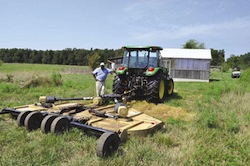




Post a comment
Report Abusive Comment